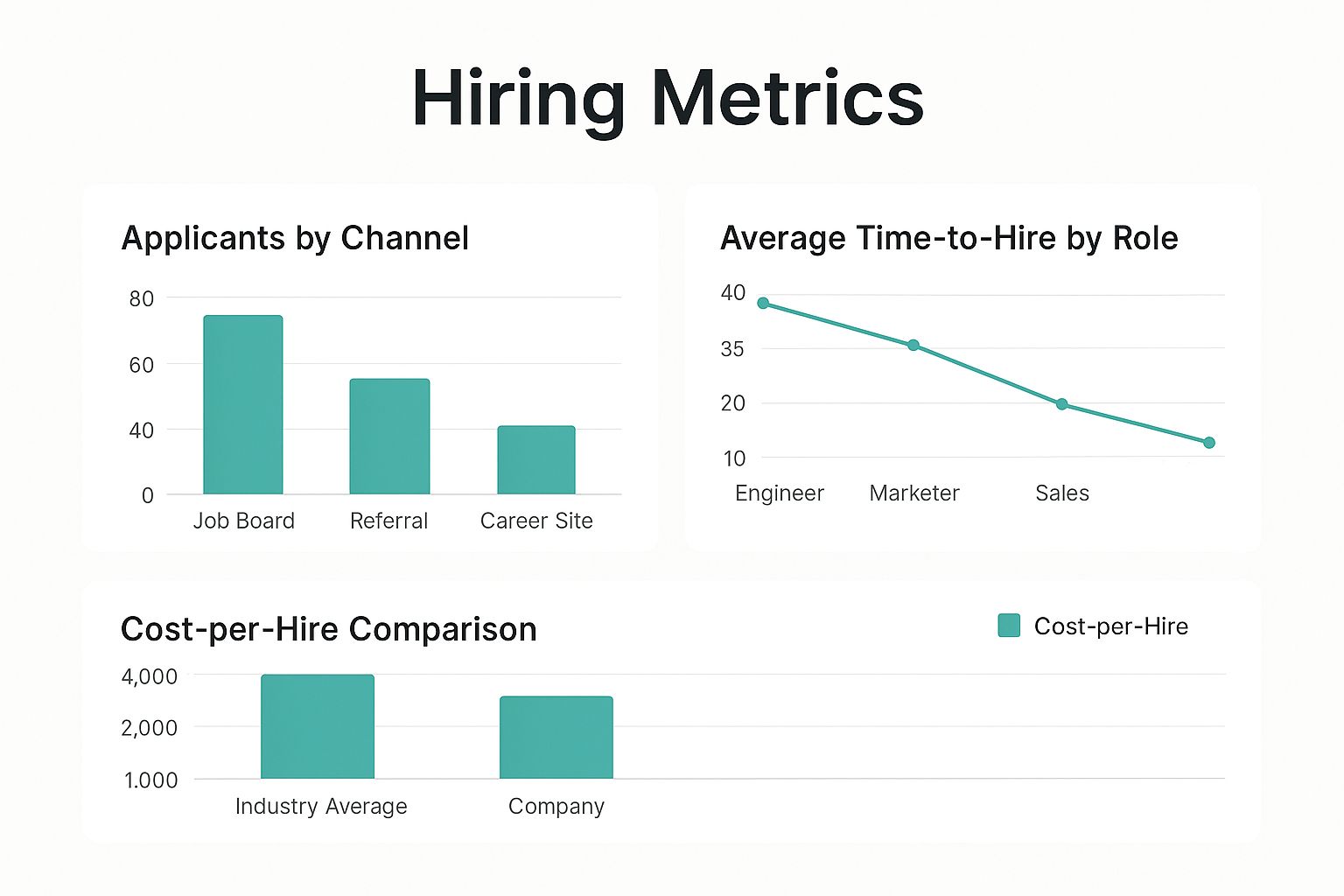Understanding What Makes Winning Startup Teams

Building a startup team is a lot like assembling a crew for a challenging expedition. You need the right blend of skills and personalities to navigate the unknown and overcome obstacles. Surprisingly, traditional hiring methods often fall short for startups. A staggering 90% of ventures fail because of team dynamics, not product shortcomings. This section explores the key ingredients of a winning startup team.
The Importance of Adaptability and Shared Vision
Successful startup teams are grounded in adaptability and a shared vision. Early-stage environments are constantly changing, requiring individuals who can adjust quickly and embrace uncertainty. A rigid corporate structure simply won't work.
Instead, cultivate a culture of flexibility and open communication. A well-defined and inspiring vision unites the team, providing direction and motivation during inevitable challenges.
The Power of Complementary Skills and Personalities
Building a startup team isn't about finding carbon copies of yourself. It's about identifying individuals whose strengths balance your weaknesses. Think of it as assembling a puzzle: each piece is unique but vital for completing the bigger picture.
A visionary leader, for example, might benefit from a pragmatic operations manager to execute their ideas. Diverse personalities bring varied perspectives and approaches, fostering creativity and problem-solving. This diversity is essential for tackling the complex challenges startups encounter.
Navigating the Changing World of Work
Building a successful startup team also requires understanding the evolving nature of work. The rise of remote and hybrid work models has transformed how teams communicate and collaborate. By the end of 2023, 25% of professionals in North America were projected to work remotely.
This shift has placed increased importance on team building, as 52% of employees have considered leaving a job due to a lack of community. Learn more about team building statistics. Investing in team-building activities and clear communication channels creates a sense of belonging and fosters strong relationships, no matter where team members are located.
Assessing Team Chemistry and Avoiding Costly Mistakes
Team chemistry is a crucial ingredient for success. A team with strong individual skills can still fail if they can't work together effectively. It's important to assess team dynamics early and address conflicts or communication breakdowns promptly.
This might involve team-building exercises, regular feedback sessions, or even difficult conversations about roles and responsibilities. Prioritizing team chemistry and proactively addressing challenges builds a solid foundation for long-term success. This proactive approach is key to navigating the complexities of building a high-performing startup team.
Finding Your First Key Players Who Actually Deliver
Your startup's initial hires are critical. These first team members will significantly shape your company's trajectory and influence its future success. It's not about finding the absolutely perfect candidate on paper, but rather about identifying individuals who flourish in the fast-paced, often unpredictable environment of a startup. They must be adaptable, resourceful, and genuinely passionate about your vision.
Unconventional Sourcing Strategies: Beyond the Job Board
While traditional job boards like Indeed can be helpful, they often don't attract the kind of talent that thrives in dynamic startup settings. To find those key players who will truly make a difference, consider exploring these less conventional avenues:
- Industry Events and Meetups: These events offer valuable networking opportunities, allowing you to connect with passionate individuals actively engaged in your field.
- Online Communities: Platforms like LinkedIn, Slack groups, and specialized forums can be excellent resources for discovering talent with specific skill sets.
- University Partnerships: Collaborating with universities gives you access to a pool of driven graduates eager to launch their careers and make an impact.
- Referral Programs: Leverage your existing network by encouraging referrals. Referrals are often higher-quality candidates because they come pre-vetted by someone you trust.
Don't restrict your search to only those actively looking for jobs. Passive candidates, those not actively seeking new roles, can be a rich source of untapped talent. Reach out to them through targeted messages on LinkedIn or leverage your network for introductions. For insights on finding a technical co-founder, check out this resource: How to Find a Technical Co-founder.
Interviewing for the Startup Mindset
After identifying potential candidates, assessing their fit for a startup environment is paramount. Traditional interview methods often fall short. Instead, structure your interviews to focus on these key areas:
- Problem-Solving Abilities: Present real-world challenges your startup faces and observe how candidates analyze the situation and formulate solutions.
- Adaptability and Resilience: Explore how they've navigated unexpected circumstances and setbacks in their past roles. This will give you insight into their ability to handle the inevitable curveballs of startup life.
- Cultural Fit: Evaluate their values and work style to ensure they align with your startup’s culture. Focus on behaviors and values, not personal preferences, to avoid bias in your hiring process.
Compensation Negotiations: Creativity Over Cash
Early-stage startups usually can't match the salaries offered by larger, established companies. But they can offer something much more valuable: equity and the chance to be a part of building something significant.
- Equity Distribution: Design equity packages that incentivize long-term commitment and reward contributions to company growth.
- Vesting Schedules: Implement clear vesting schedules to protect your company's interests and ensure fairness.
- Non-Monetary Benefits: Consider offering perks like professional development budgets, flexible work arrangements, or performance-based bonuses. These can be highly attractive to potential hires.
To help illustrate the effectiveness of different sourcing strategies, let's look at the data. The following infographic compares applicant sourcing methods, time-to-hire, and cost-per-hire.

As the infographic illustrates, referrals and industry events often yield higher-quality applicants while minimizing time-to-hire and cost-per-hire. This emphasizes the importance of strategic sourcing in building a robust startup team.
The following table further clarifies the importance of strategic hiring by outlining the differences between essential first hires and roles that can be added later.
| Role |
Priority Level |
Timing |
Key Responsibilities |
Hiring Cost |
| Lead Engineer/Developer |
Essential |
Immediate |
Develop core product, build technical infrastructure |
High |
| Head of Sales/Marketing |
Essential |
Early Stage |
Drive customer acquisition, build brand awareness |
High |
| Head of Operations |
High |
Early/Mid Stage |
Streamline processes, manage resources |
Medium-High |
| Office Manager/Admin |
Medium |
Mid Stage |
Administrative tasks, office support |
Medium |
| Customer Support Specialist |
Medium |
Mid Stage |
Handle customer inquiries, resolve issues |
Medium |
Investing time and effort in strategic sourcing and targeted interviewing can significantly increase your chances of securing the right people to propel your venture forward. Finding the right talent is an investment that will pay significant dividends as your startup grows and evolves.
Creating Culture That Drives Performance Not Ping Pong

Startup culture is often misunderstood. It's not about beanbag chairs or ping pong tables. It's about the shared values and behaviors that propel a team forward, particularly when facing challenges. This section explores how successful founders cultivate cultures that genuinely impact decision-making, not just marketing brochures.
Defining Values That Matter
Building a strong startup team begins with defining core values. These values aren't simply words on a wall. They are guiding principles shaping every decision, from recruiting new hires to developing products. When facing tight deadlines and limited resources, these values act as a compass, guiding difficult choices.
For example, if "customer focus" is a core value, it influences how you prioritize features, respond to user feedback, and interact with your customers. This clarity is essential for maintaining team focus and alignment.
Building Psychological Safety
In the ever-changing startup environment, psychological safety is paramount. It means creating a space where team members feel comfortable taking risks, sharing ideas, and admitting mistakes without fear of repercussions. This fosters open communication and encourages innovation.
Moreover, psychological safety boosts team morale and engagement. When individuals feel supported and respected, they are more likely to contribute their best work. This creates a positive feedback loop, enhancing individual and team performance.
Maintaining Culture as You Scale
As your team grows, maintaining a strong culture can be difficult. Strategies that worked for a small team might not be effective for a larger one. However, by implementing deliberate strategies, founders can preserve the core values and practices that define their company.
Effective team building plays a vital role in maintaining a positive culture and directly impacts business performance. In fact, collaborative efforts significantly influence revenue and the bottom line. Find more detailed statistics here. As teams expand, establishing clear communication channels, consistent feedback mechanisms, and opportunities for team bonding becomes even more critical. This ensures that your culture remains a strength as your startup grows.
Rituals and Practices That Reinforce Culture
Successful founders understand the importance of rituals and practices in reinforcing desired behaviors. These can include weekly team meetings, regular feedback sessions, or celebrating milestones together. These rituals build a sense of community and reinforce the values underlying your culture.
Furthermore, they create opportunities for team members to connect personally, building stronger relationships and improving communication. This connection is crucial for overcoming the challenges of building a startup. By implementing these strategies, founders build a culture that is not only productive but also fulfilling and sustainable.
Mastering Remote Team Building That Actually Works
Many companies are embracing remote work. Building a strong startup team now requires mastering connection and accountability across distances. This isn't about mandatory virtual happy hours. It's about fostering genuine relationships and a shared purpose, even when team members are miles apart. Surprisingly, some remote-first startups demonstrate even stronger team cohesion than traditional in-person companies. Let's explore the key strategies that make this possible.
Communication Frameworks for Remote Success
One of the biggest hurdles in remote team building is communication. Without the nuances of in-person interaction, misunderstandings can easily occur. Therefore, establishing clear communication frameworks is essential.
For example, using a platform like Slack for daily communication alongside project management tools like Asana can create transparency and keep everyone aligned. Regular video calls for team meetings and one-on-one check-ins also foster connection and allow for real-time discussions. This blend of asynchronous and synchronous communication creates a balanced approach. It caters to different communication styles and preferences, meaning remote teams can communicate more effectively than those in a traditional office.
Collaboration Tools That Enhance Productivity
The right collaboration tools are crucial for remote team productivity. These tools become the virtual office where teams interact and achieve shared goals. Google Workspace facilitates real-time document editing and file sharing, while cloud-based design platforms like Figma enable seamless collaboration for creative teams.
The key isn't just having the tools, it's using them effectively. Clear guidelines for file organization, version control, and communication within these platforms can minimize confusion and streamline workflows. By thoughtfully selecting and implementing the right tools, remote startups can significantly improve their team’s productivity and efficiency, potentially surpassing that of traditional office environments.
Onboarding Remote Hires Effectively
Onboarding remote employees requires a different approach than traditional in-person onboarding. A structured process is essential. This process welcomes new hires, provides necessary resources, and integrates them into the team culture.
This might include virtual introductions to team members, detailed documentation about company processes, and regular check-ins with their manager. Opportunities for informal interactions, such as virtual coffee breaks or online team-building activities, can help new hires feel connected. This fosters a sense of belonging and reduces the isolation that remote workers can sometimes experience. These strategies contribute to a more successful and engaged remote workforce.
The virtual team building market is growing rapidly as more companies adopt remote work models. The global market size was valued at approximately $0.79 billion in 2024 and is projected to reach $2.02 billion by 2033, with a CAGR of 12.3%. This growth is driven by the increasing prevalence of remote work, which demands innovative solutions for team cohesion and engagement. Explore this topic further.
Managing Across Time Zones and Cultures
Many remote startups operate across multiple time zones and cultures, adding complexity to team building. Establishing clear communication protocols and flexible meeting schedules is critical for accommodating these differences.
For remote teams, start by building stronger connections with your teammates. Fun virtual team icebreakers can boost remote collaboration. Promoting cultural awareness and sensitivity within the team fosters understanding and respect. By embracing these differences and adapting communication strategies, remote startups can build truly global and inclusive teams.
Compensation and Equity Strategies That Attract Talent

Attracting top-tier talent is essential for any startup's success. Early-stage companies often operate with limited budgets, presenting a significant challenge. However, startups possess a powerful tool: the potential for substantial growth and impact. This potential becomes a cornerstone of a compelling compensation strategy, balancing immediate financial needs with the promise of future rewards.
This section explores how to structure compensation packages to attract and retain valuable team members in the competitive startup environment.
Equity: Sharing the Upside
Startups might not offer hefty salaries initially. However, they can offer equity, a share of ownership in the company. This gives employees a direct investment in the startup's success, aligning their interests with the company's overarching goals. If the company performs well, the value of their equity increases, potentially leading to significant financial gains.
Effective equity distribution is vital. It must motivate employees without overly diluting the founders' ownership. Clearly defined vesting schedules, where ownership increases over time, encourage long-term commitment. Learn more about founder and co-founder dynamics in our article: the difference between a founder and co-founder. These strategies create a mutually beneficial situation for both employees and the startup.
Communicating the Value of Equity
Many potential hires, especially those transitioning from established companies, may not fully understand the potential value of stock options. Clearly communicating this potential upside is critical. This involves explaining the company's growth trajectory, market opportunity, and how equity can translate into substantial financial returns.
Transparency is key. Openly discussing the company's valuation and potential exit scenarios helps candidates understand the true value of their equity stake. This builds trust and makes equity a more attractive and tangible component of the overall compensation package.
Creative Compensation Approaches
Beyond salary and equity, startups can leverage creative compensation strategies to attract and retain talent:
- Professional Development Budgets: Investing in employee growth demonstrates a commitment to their long-term success.
- Flexible Benefits: Options like remote work or flexible hours can be particularly appealing.
- Performance Bonuses: Tying bonuses to specific milestones aligns individual contributions with company objectives.
These additional benefits can be highly valuable, particularly for candidates prioritizing work-life balance and career development. They provide a tangible way for startups to compete with larger companies that may offer higher base salaries.
The following table summarizes the different components of a startup compensation package, their typical ranges, advantages, considerations, and who they are best suited for:
Startup Compensation Package Components
| Component |
Typical Range |
Advantages |
Considerations |
Best For |
| Salary |
Varies widely based on role, experience, and location |
Provides stable income |
Can be a significant expense for early-stage startups |
All employees |
| Equity (Stock Options) |
0.5% - 5% for early employees |
Potential for significant financial gains if the company succeeds |
Value is uncertain and depends on the company's performance |
Early employees and key hires |
| Performance Bonuses |
Tied to individual or company milestones |
Incentivizes strong performance and aligns goals |
Requires clear metrics and tracking |
Employees in roles with measurable outputs |
| Professional Development Budget |
$1,000 - $5,000 per year |
Helps employees grow their skills and advance their careers |
Requires a system for tracking and approving expenses |
All employees |
| Flexible Benefits (Remote Work, Flexible Hours) |
Varies |
Improves work-life balance and attracts talent who value flexibility |
Requires careful planning and management to ensure productivity |
Employees who can work effectively independently |
Legal Compliance and Flexibility
While flexibility is crucial in a startup, maintaining compliance with employment laws is paramount. This involves understanding legal requirements related to salaries, benefits, and equity. Startups should create clear employment agreements outlining roles, responsibilities, and compensation details. This clarity protects both the company and its employees.
Scaling Without Losing What Made You Special
Scaling a startup is a delicate balancing act. The very qualities that propel early success—agility, a close-knit team, and a shared sense of mission—can become diluted as the company grows. This section explores how successful startups scale systematically while preserving the core elements that fueled their initial wins. Learn how to thoughtfully expand your team while safeguarding your startup's distinct culture.
Identifying When to Grow (and When to Hold Back)
As your startup gains traction, it's tempting to rapidly expand your team. However, premature scaling can strain resources and disrupt established dynamics. One key to successful scaling is recognizing when to add new roles and when to maximize your existing team’s capabilities.
For example, consistently exceeding sales expectations signals a likely need to expand your sales team. However, if current team members can efficiently handle certain functions, resist the urge to hire prematurely. You might be interested in: How to master startup team structures. Careful assessment of workload, current capabilities, and future projections will inform strategic hiring.
Structuring Teams for Effective Communication
Maintaining clear communication becomes increasingly challenging as your team expands. Establishing transparent reporting structures and communication protocols prevents misunderstandings and keeps everyone aligned.
This might involve implementing project management software, creating dedicated communication channels for various teams, or holding regular all-hands meetings. These structured approaches maintain transparency and facilitate efficient information flow as your team evolves from a small group to a larger, more complex organization. Think of it like building a house: a robust foundation of communication supports future growth.
Building Specialized Departments: Timing is Everything
Startups often begin with a flat organizational structure, where individuals wear many hats. As the company matures, establishing specialized departments becomes essential for managing growing complexity and maintaining focus.
However, timing is critical. Creating departments too early can lead to unnecessary silos and stifle the collaborative environment essential for startup success. Wait until the workload within a specific function justifies a dedicated team. This strategic approach ensures that departments enhance, rather than hinder, efficiency.
Maintaining Culture Through Growth Phases
Company culture is not static; it evolves alongside the company. Preserving the essence of your startup’s culture during rapid expansion requires deliberate effort. This could involve establishing rituals that reinforce core values, creating team bonding opportunities, or implementing regular feedback systems.
Examining case studies of startups that successfully managed rapid growth reveals effective strategies for maintaining culture at different stages: 20 people, 50 people, and 100+ people. Each stage presents unique challenges and necessitates adapted approaches, including mentorship programs, team-building activities, or company-wide initiatives that strengthen shared values.
Measuring Team Health and Maintaining Your Competitive Edge
As your startup expands, tracking team health becomes vital. This goes beyond typical performance metrics. Regularly assessing factors like employee satisfaction, communication effectiveness, and cultural alignment can identify potential problems before they escalate.
This might involve conducting employee surveys, implementing regular feedback sessions, or tracking team performance on key projects. By proactively monitoring team health and adapting accordingly, you ensure that your team remains a significant competitive advantage, even as your startup navigates the complexities of growth and expansion. This proactive approach is key for long-term success.
Key Takeaways
Building a startup team is like assembling a championship sports team. You need the right players in the right positions, all working together toward a shared objective. It's not solely about individual brilliance; it’s about fostering a cohesive unit that can navigate challenges and achieve remarkable results. This section highlights key takeaways for building a startup team, providing practical insights for every step of the journey.
Prioritize Vision and Adaptability
A shared vision is the foundation of any successful startup team. It unites individuals around a common purpose, giving them direction and motivation. This shared understanding of the company's trajectory fosters commitment and resilience, especially when facing obstacles.
Furthermore, adaptability is essential. Startups operate in dynamic environments. Team members must be flexible, embrace change, and readily adapt to new information and evolving market dynamics.
Master the Art of Team Dynamics
Think of your team as a complex clock. Each gear, representing an individual with unique skills and personality, is vital for the clock to function seamlessly. Building a startup team requires a deep understanding of how these different "gears" interact and collaborate. Seek out complementary skills and personalities. For example, a visionary leader benefits from a pragmatic executor to bring their ideas to fruition.
Early evaluation of team chemistry is critical. Address conflicts or communication breakdowns promptly. Much like in sports, team cohesion and effective communication are vital for success. Utilize team-building activities and cultivate open communication. This builds trust and strengthens relationships, empowering the team to overcome challenges and achieve shared goals.
Remote Team Building: Connection and Accountability
With the rise of remote work, building a strong remote team requires mastering connection and accountability across distances. Implement clear communication frameworks and leverage collaboration tools. Regular video conferences for team meetings, along with project management platforms like Asana, keep everyone informed and aligned. Scaling a startup team effectively is paramount; for further insights on scaling an e-commerce business, see this article: How to Scale Ecommerce Business.
Effectively onboarding remote hires is also vital. Provide structured onboarding programs that integrate new team members into the company culture and furnish them with the necessary tools and resources. This minimizes isolation and ensures a smooth transition for new hires while also strengthening overall team dynamics.
Compensation: Balancing Cash and Equity
Early-stage startups often struggle to match the salaries offered by larger companies. However, they possess a unique advantage: equity. This provides employees with a stake in the company's success, aligning their interests with the company's future.
Structure compensation packages strategically. Balance immediate financial needs with long-term incentives. Clearly communicate the potential value of equity to attract and retain top talent. For instance, explain the company's growth projections and how equity could yield substantial financial returns in the future. Consider creative compensation approaches like professional development budgets and flexible work arrangements to enhance your overall offering.
Scaling While Preserving Your Unique Culture
The most challenging aspect isn't building a great initial team, but maintaining that positive dynamic as your company grows. As your startup expands, maintain a strong emphasis on your culture. This involves preserving the values, practices, and work style that contributed to your team’s initial success. Regularly assess team health through employee surveys and feedback sessions. This allows you to identify and address any cultural shifts or emerging concerns. Remember, a strong culture attracts and retains talent, fostering a positive and productive work environment.
Actionable Checklists for Each Stage
- Pre-Hiring: Define core values, outline required skills, and establish a clear hiring process.
- Onboarding: Develop a structured onboarding program, introduce new hires to the team, and establish clear expectations.
- Team Development: Implement regular team-building activities, foster open communication, and provide opportunities for skill development.
- Scaling: Establish clear communication channels, maintain cultural consistency, and develop adaptable compensation strategies.
- Retention: Conduct regular performance reviews, offer opportunities for career growth, and prioritize employee well-being.
By implementing these strategies, you can ensure that your startup team becomes your greatest asset, driving innovation, growth, and long-term success. Ready to build your dream startup team? IndieMerger connects verified founders with complementary skills. Our AI-powered platform helps you find the perfect co-founder in days, not months. Learn more about IndieMerger and start building your team today!